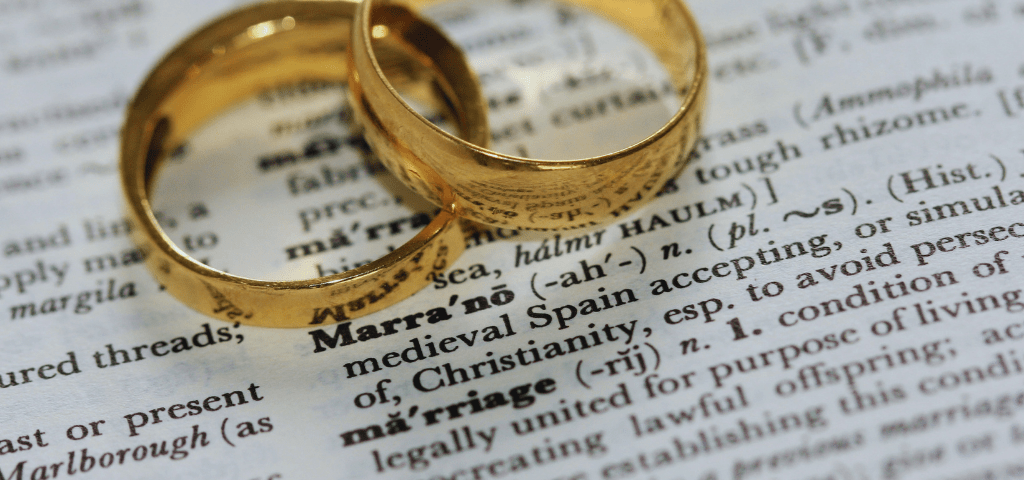Why is Modern Marriage So Hard?
October 6, 2021 by Justin Lehmiller
Is marriage harder now than it was in the past? Are we expecting too much from our spouses today?
I recently interviewed Dr. Eli Finkel for the Sex and Psychology Podcast. He is a professor at Northwestern University, with appointments in the psychology department and the Kellogg School of Management. I asked him to discuss what he learned about the evolution of marriage while researching his book, The All-or-Nothing Marriage: How the Best Marriages Work.
Below is an excerpt from our conversation (you can listen to it in full in this podcast) in which we consider how and why expectations for our marriages have changed over the last century. Note that this transcript has been lightly edited for clarity.
Justin Lehmiller: Let’s talk about marriage since you’ve written the book on it. As a starting point, I want to address this idea of how marriage has changed over the last century or so.
I know it has changed in a lot of ways. For example, if you look at statistics now, the marriage rate in the U.S. is at, or near, a record low. We also know that people are waiting longer than ever to get married. It used to be that people got married closer to age 20. Now it’s closer to age 30 for their first marriage, if they marry at all. Also, what people want out of their marriages has changed, too.
So, tell us a little bit about that. How have our expectations and desires around marriage changed over the last century?
Eli Finkel: This was one of the great, fun things about writing a book for a general audience—social psychologists, people like you and I, we run our studies, bring couples into the lab, video record them, and follow them over time. I’m extremely proud to be associated with that intellectual tradition, but I don’t think we’ve done a particularly good job of thinking through cultural differences or historical differences. And, so, one of the things that I decided to do some years back was to get a better sense of the anthropology of marriage, the history of marriage, the economics of marriage. I wanted to get a broader sense of the way other people outside of my home discipline of social psychology have been thinking about these issues.
I was kind of blown away by what I learned and how much I was taking things for granted that were very historically and culturally situated. For example, as you know, the historians and sociologists have done a great job of telling us how the institution of marriage—and by that, I mean middle-class expectations of what makes for a good marriage—have changed. A couple hundred years ago, nobody stood at the altar and said, “I’m marrying you because you’re my best friend,” right? That is a very new set of ideas, and we’re not particularly aware of how those things have changed. And having awareness of how the changes have happened, I think, helps to inform us today of how we can make our own marriages better.
Justin Lehmiller: When it comes to the expectations that we have for marriage, you mentioned this idea that people expect their partner to be their best friend and that this is one of the newer changes. But one of the key points that you make in your book, is that we’re now expecting a lot more in some ways from our marriages than we did before.
And with great expectations often comes great disappointment, right? The more we expect of anything—whether that’s a marriage, a new job, acting out a sexual fantasy, and so forth—the easier it is for things to fall short of that expectation. So, what’s the answer to that? Do we need a reality check? Do we need to lower our expectations?
Eli Finkel: You know, it’s funny. I mean, there are two little backdrop pieces of information here. The first is because you and I come from basically the exact same intellectual lineage in social psychology, there’s a lot of work about how no matter what your circumstances are, you’ll be less happy with them if your expectations are high than if they’re low. And when I initially set out to write this book, it had some terrible working title like The Freighted Marriage. And the idea was like, my goodness, look at all this stuff that we’re asking of this one relationship today relative to in the past.
I think maybe the single most eye-opening thing that happened to me as I went into those other literatures and I learned more about the changes that have happened—not only on the order of decades, but also on the order of centuries—is that I wasn’t totally wrong. We are asking a ton more of our marriages in some respects, but it turns out that there are really major ways in which we’re asking a lot less.
So, the story wasn’t really just about us asking more and more and more; it was about changing the nature of those asks. The thing that’s really vivid for me is a couple hundred years ago, people literally looked to their spouse for basic survival needs: food, clothing, shelter, the production of light. People made the candles, right? And it was the family that made the candles. Sure, you did some bartering, but nobody kissed somebody goodbye and went to work at the office, or almost nobody did. The individual farmhouse was the unit of economic production.
People tried to figure out how to survive in an era without air conditioning, without supermarkets. Those sorts of expectations for our partners that were absolutely essential before are not meaningless now. It’s not like we don’t care about marrying somebody who’s a good provider; however, the life and death nature of the marriage decision has largely gone away. And I think we are well-served to recognize that that is a significant reduction in what we’re asking.
So the shift isn’t really about asking more versus asking less. I framed it in terms of Maslow’s Hierarchy: we used to look to marriage to fulfill those basic physiological and safety needs at the bottom of the pyramid. Things like making sure we don’t freeze to death and making sure we have enough food. Then, in the middle of this hierarchy are love and belonging sorts of needs. And then it’s really toward the top that we look to esteem and self-actualization needs. So, I think we’re asking a lot less at the bottom when it comes to what we’re looking for in a marriage, but a whole lot more for needs at the top of Maslow’s Hierarchy.
Justin Lehmiller: I think the way that you described that is beautiful for emphasizing why you need that historical and cultural perspective when you’re trying to understand relationships and how they’ve changed and evolved over time; because you can’t just look at what the expectations we have today are. You have to look at how the world around us has changed at the same time, and how that changes what we want or need from our relationships.
Listen to my full conversation with Eli in this podcast.
Want to learn more about Sex and Psychology? Click here for more from the blog or here to listen to the podcast. Follow Sex and Psychology on Facebook, Twitter (@JustinLehmiller), or Reddit to receive updates. You can also follow Dr. Lehmiller on YouTube and Instagram.
Image Source: Photo by Sandy Millar on Unsplash

Dr. Justin Lehmiller
Founder & Owner of Sex and PsychologyDr. Justin Lehmiller is a social psychologist and Research Fellow at The Kinsey Institute. He runs the Sex and Psychology blog and podcast and is author of the popular book Tell Me What You Want. Dr. Lehmiller is an award-winning educator, and a prolific researcher who has published more than 50 academic works.
Read full bio >


